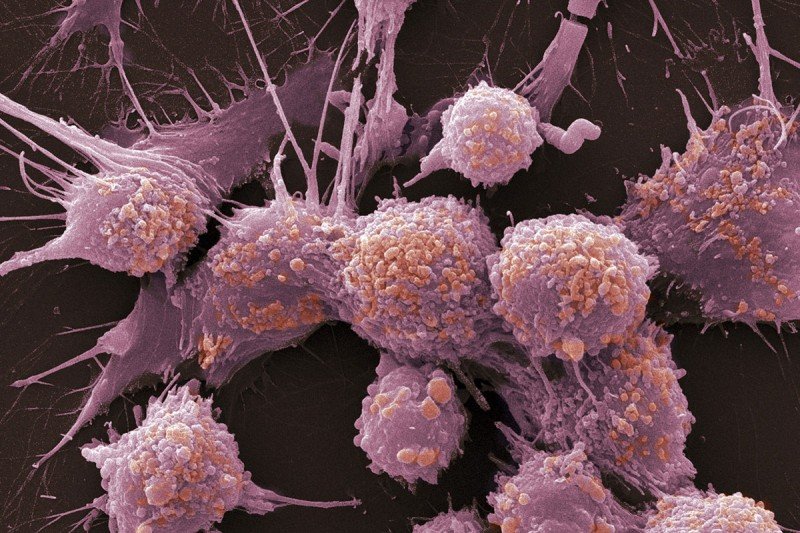
A protein called PSMA helps fuel the development of prostate cancer cells.
Prostate-specific antigen (PSA) can be an indicator of prostate cancer and is easily detected and measured with a blood test. But another protein, prostate-specific membrane antigen (PSMA), is also linked to prostate cancer. PSMA is present at a low level even in normal prostate tissue, but the amount is markedly higher in prostate cancer cells.
PSMA is a transmembrane protein — meaning it exists across the cell membrane — but 95 percent rests on the surface of prostate cells. Due to this external location, it is very accessible to researchers targeting it with molecules for the purpose of imaging or delivering drugs. Researchers have long regarded PSMA mainly as a means to an end, without fully understanding its biological purpose.
How PSMA Fuels Prostate Cancer
Now a team of researchers led by MSK radiologist and molecular imaging specialist Jan Grimm has discovered that PSMA plays a role in prostate cancer’s development. They report in the Journal of Experimental Medicine that PSMA indirectly activates a cancer-causing pathway that involves the PI3K protein kinase.
“Everybody knew that PSMA was related to more-aggressive prostate cancer, but nobody was able to figure out its biological role,” Dr. Grimm says. “Knowing how it helps trigger PI3K has important implications for treating men with prostate cancer.”
In cell and animal experiments, as well as in tumor samples from patients, Dr. Grimm’s team found that PSMA causes the release of the amino acid glutamate, which acts as a second messenger to bind to a receptor on the surface of prostate cells. This binding transmits a signal to the cell to help activate the PI3K pathway. Dr. Grimm’s team showed that targeting PSMA with drugs slowed PI3K signaling, as well as the growth and spread of PSMA-expressing tumors, and, in the animal subjects, allowed them to live longer.
Dr. Grimm explains that PSMA inhibitors could potentially be used in combination with the existing prostate cancer drugs called androgen inhibitors, which block hormones that fuel cancer growth.
Some nutrients, such as vitamin B9, actually contain glutamate. This suggests that vitamin B9 could possibly play a small role in fueling prostate cancer through its interaction with PSMA, although Dr. Grimm cautions that more research needs to be done.
Improving Prostate Cancer Classification and Treatment
The finding could also help doctors more accurately predict how a prostate tumor might behave in certain people. PSMA is easily detectable on PET scans. Such images could allow researchers to reliably detect the presence of cancer and to understand the cancer’s aggressiveness.
“This could help with prognoses and help doctors make better treatment decisions,” Dr. Grimm says. “For example, there are some men with aggressive prostate cancer that doesn’t have much PSMA expression, which may not need to be treated that aggressively.”
The Role of PSMA in Solid Tumors
The role of PSMA in tumor growth is probably not limited to just prostate cancer, says Dr. Grimm. The protein is commonly found in the inner lining of blood vessels that supply other solid tumors, such as bladder cancer or colorectal cancer. Targeting PSMA in these blood vessels cells could starve a tumor to death by cutting off its food supply.
“We’re trying to apply what we’ve learned from the prostate cancer cells to see if the same effects hold true in these other settings,” Dr. Grimm says.









